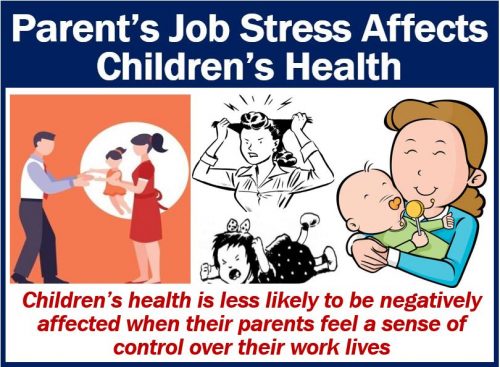Most studies have looked at children’s effect on worker performance, but not the other way round. In other words, we know very little about how parents’ work life might affect the health of their kids.
A team of researchers from the USA and Nigeria carried out a study on whether parents’ work life might affect their children’s health. They wrote about their study and findings in the Journal of Occupational Health Psychology (citation below).
The authors reported that there is a smaller likelihood of a negative effect on kids if their parents feel that they can control their work life.
Co-author Christiane Spitzmueller, a Professor of Industrial Organizational Psychology at the University of Houston, said:
“If you can decide how you are going to do your job, rather than having that imposed on you, it is better for children.”
There are things employers can to provide employees with a sense control over their work life, Prof. Spitzmueller said.

In an Abstract that precedes the main article in the journal, the authors wrote: “Moderator analyses of the multisource data reveal that self-regulatory resources matter for child health only when job demands are high or when job autonomy is low, pointing to potential intervention and policy levers.”
Work life data from parents in Nigeria
The researchers gathered data from parents and their children in Lagos in Nigeria. They targeted two groups: 1. Low-income families. 2. More affluent families.
The authors surveyed teenage children in both groups at their schools. The children were also asked to assess their own health.
The researchers say that their findings are applicable in the US. The more affluent families in the study had socioeconomic and academic levels similar to those in western countries. Their expectations of family life were also similar.
Work life has similar impact on both groups
The low-income group included families living in dire poverty. However their responses did not differ much from those of the wealthier families, Prof. Spitzmueller noted.
Prof. Spitzmueller said:
“Economic resources were not as much of a buffer as we would have thought.”
What influenced children’s general health the most was their parents’ feelings of autonomy in the workplace. In other words, parents who felt in control of their work life had kids with fewer health problems.
The authors also looked at parents’ ‘self-regulatory resources.’ In other words, they observed the amount of self-control parents brought to parenting. This included their ability to act more reflectively.
Prof. Spitzmueller explained that parents with too many stressors had less self-control. The researchers identified a link between parental self-control and better health outcomes for their kids. In other words, how we parent while experiencing high stress levels is probably basically different from how we parent when we are in control.
Autonomy in our work life affects how we act
The authors wrote:
“At lower levels of job autonomy, employees likely have to rely more on self-regulatory resources to compensate for the impact of limited control over one’s job on one’s personal life.”
“At higher levels of job autonomy, freedom and more decision-making opportunities are likely to motivate the person to engage; however, self-regulatory resources would be less needed.”
The impact was most evident when job demands were high while job autonomy was low, the authors found. That, Prof. Spitzmueller added, allows for potential intervention and policies to deal with the issue.
Some things employers can do to help are relatively simple. They include, for example, teaching parents to take a few minutes for themselves. During that time they can recharge before switching from workplace to parent ‘mode.’ Parents can also ‘replenish their resources’ by practicing mindfulness, Spitzmueller Prof. added.
Mindfulness is a state of being completely aware of what is happening outside and inside ourselves, on a moment-to-moment basis.
Employers can play a role
According to a University of Houston press release:
“Businesses and organizations can play a role, as well. Although the researchers say their findings are just the start of understanding how parental stressors affect children’s well-being, they also encourage workplace interventions aimed at promoting job autonomy.”
It is possible to train supervisors and managers to deal with their employees more effectively. They can also be trained to encourage a greater sense of autonomy, the authors said.
Citation
“When work-family conflict hits home: Parental work–family conflict and child health,” Ohu, Eugene Agboifo; Spitzmueller, Christiane; Zhang, Jing; Thomas, Candice L.; Osezua, Anne; Yu Jia. Journal of Occupational Health Psychology (2018). DOI: http://dx.doi.org/10.1037/ocp0000145.
